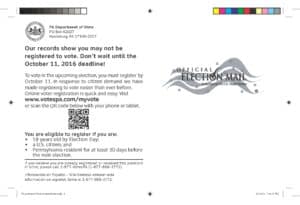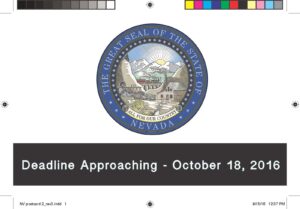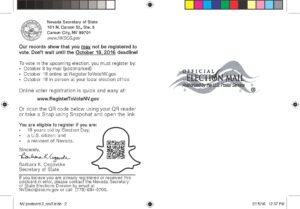Georgia First Executive Director Provides Public Testimony & Submits Written Comments to Senate Ethics Committee on House Bill 397
March 26, 2025
Honorable Chairman Watson and Committee Members,
I’m Natalie, founder and executive director of Georgia First, a nonprofit think tank and policy advocacy organization. I appreciate having a moment to speak tonight at the hearing [begin testimony at 3:12:24]. Below, as promised I submit to you my full comments:
Thank you for the opportunity to comment on a few element elements included in the committee substitute for HB 397. I also want to thank the authors Representative Fleming and my fellow former Habersham County Commissioner, Representative Anderson. I believe each of you genuinely want to get this right.
Georgia First would like to request of the committee that rather than moving forward with the current language in Section 5 related to ERIC, to create a subcommittee to study this issue and a determine an appropriate solution and the subcommittee recommend that solution to this body.
I agree wholeheartedly with Senator Williams, the state needs something to help with voter-list maintenance and maintain our good record of keeping roles clean. That said, prospect of multiple MOUs is likely to be far more costly to the state. I would note — The Heritage Foundation ranks Georgia #2 overall for election integrity — scored 22 out of 28 on accuracy of voter roles.
If I may share a few points regarding ERIC:
- Claims that ERIC is partisan are simply false. It is a secure, effective, and state-led tool for maintaining accurate voter rolls. [Learn more about ERIC by viewing their FAQs.]
- Every member state has one vote and helps set dues, budgets, and security standards. Red states leaving en masse certainly skews the membership. Perhaps what we should be doing is encouraging more states to join.
- Just the day before yesterday, the Atlanta Journal-Constitution reported that Georgia is set to cancel 455,000 inactive registrations — over half of the registrations were identified through ERIC. Based on information shared by the SOS office today, approximately 250k of those are due to data received from ERIC.
We submit a 2024 academic study addressing claims of partisanship (this study was submitted hard copy to the committee but have attached it for reference as well)
- Conducted by four political science professors
- The study used 2016 data from Pennsylvania and Nevada to evaluate mailers sent to eligible but unregistered voters.
- Registrations increased, but neither party disproportionately benefited (p. 14).
- There is no evidence these mailers impacted election outcomes.
To further clarify the issue of mailers: [Scroll to bottom of this post to view mailer images.]
- Georgia, as well as other states, have an exemption and do not send mailers to eligible but unregistered voters.
- Each state controls its own mailers
- Member states do not need ERIC or other states’ approval for final mailers.
- For the record — the mailers you have in the packet were created years (2016, I believe) before the 2020 election. These are a basic tool for civic engagement, not partisanship.
Please consider a subcommittee to take the appropriate time to study this further.
Separately, we strongly OPPOSE the committee substitute language included under Section 6, making the State Election Board a mandatory stop prior to superior court. Requiring the State Election Board (SEB) to serve as a mandatory intermediary in the appeals process for voter registration challenges introduces several significant concerns:
- Potential for Partisan Influence:
- The State Election Board is not a court of law to be granted appellate authority, especially when dealing with an individual’s right to vote.
- The SEB’s composition is determined by political appointments, raising the risk of decisions influenced by party affiliations. This could compromise the impartiality essential in adjudicating voter eligibility disputes.
- Increased Administrative Delays:
- Mandating that appeals pass through the SEB adds an additional procedural layer, potentially delaying the resolution of voter registration challenges. Such delays could disenfranchise voters, especially if challenges remain unresolved close to election dates.
- Strain on SEB Resources:
- The SEB may lack the necessary infrastructure and resources to efficiently handle a high volume of appeals, leading to bottlenecks and further delays in the electoral process.
- Legal Precedents Highlighting SEB’s Limitations:
- Recent judicial decisions have questioned the SEB’s authority in certain election-related matters. Georgia’s Supreme Court declined to reinstate several SEB-imposed election rules, deeming them “illegal, unconstitutional, and void.” This underscores concerns about the SEB’s capacity to function as an impartial adjudicatory body.
- Potential Conflicts with Established Legal Frameworks:
- Introducing the SEB as a mandatory appellate body may conflict with existing laws that outline clear procedures for voter registration challenges and appeals, potentially leading to legal ambiguities and further complications.
In short, integrating the SEB as a compulsory step in the appeals process for voter registration challenges could introduce risks of partisan bias, administrative inefficiencies, and legal conflicts. Maintaining a direct route to judicial review ensures adherence to principles of impartiality and expediency in safeguarding voter rights. Please consider carefully the full implications of such a drastic change. We respectfully ask that you delete this section of the committee sub and allow the appeals to remain as they are.
If I can provide any additional information or answer any questions, please reach out. I sincerely thank you all for your service to Georgia.
Natalie Crawford, Founder & Executive Director





0 Comments